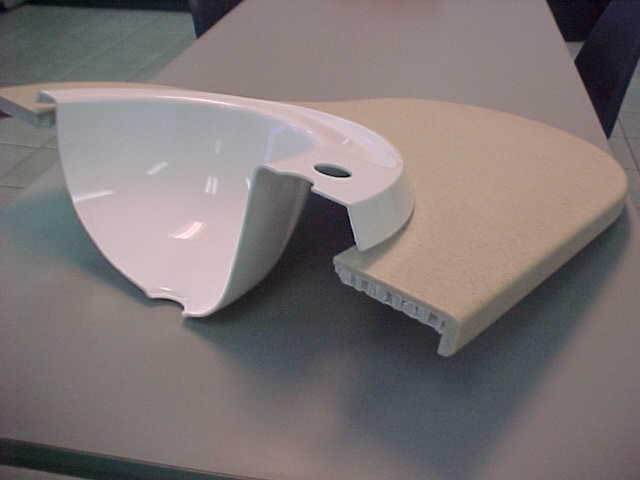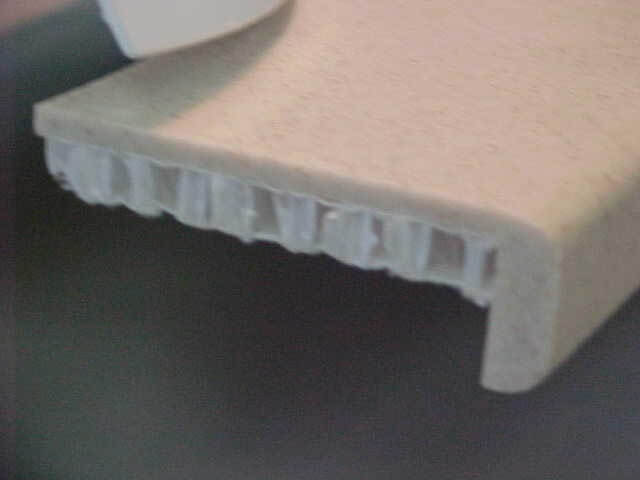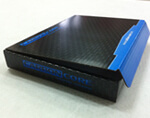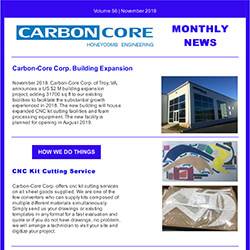Industry, in general, calls widely upon polyester for the flexibility of use it affords.
It also increasingly calls upon thermoplastics for its low processing cost (especially for high volume applications) and recyclability. CarbonCore Plastic Honeycomb excels in both instances.
CarbonCore Plastic Honeycomb materials are widely combined with this process for the production of parts such as:
- Molds-tooling (excellent reduction in bond line heat reduction)
- Tanks for food or chemical products
- Platforms for specific uses
- Cowlings for wind power turbines
- Spray booths
There are many applications for which CarbonCore Plastic Honeycomb adds its corrosion or chemical resistance qualities.
Solid Surface Applications
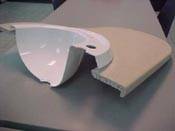 The “non-porous” quality of solid surface makes it inherently resistant to mold and mildew. This makes solid surface a natural choice for surfacing applications in kitchens, bathrooms, wet bars, pantries, laundry rooms and children’s playrooms. While most commonly used in kitchens, solid surface is finding many commercial and industrial applications as well, often “outside the box.” The performance and design qualities of solid surface make it a natural choice for home office applications. Solid surface provides a unique combination of practical, functional and decorative qualities that make it a natural choice for any home or business office surface application. The ability to fabricate any shape or size in any color or design imaginable makes it a natural choice for commercial applications as well. Solid surface products can be further enhanced for transportation and special use applications by adhering a ¼” solid surface to CarbonCore Plastic Honeycomb backer, with or without outside composite laminate skin.
The “non-porous” quality of solid surface makes it inherently resistant to mold and mildew. This makes solid surface a natural choice for surfacing applications in kitchens, bathrooms, wet bars, pantries, laundry rooms and children’s playrooms. While most commonly used in kitchens, solid surface is finding many commercial and industrial applications as well, often “outside the box.” The performance and design qualities of solid surface make it a natural choice for home office applications. Solid surface provides a unique combination of practical, functional and decorative qualities that make it a natural choice for any home or business office surface application. The ability to fabricate any shape or size in any color or design imaginable makes it a natural choice for commercial applications as well. Solid surface products can be further enhanced for transportation and special use applications by adhering a ¼” solid surface to CarbonCore Plastic Honeycomb backer, with or without outside composite laminate skin.
The benefits to choosing Solid Surface backed by CarbonCore Plastic Honeycomb are:
- Lower cost due to thinner solid surface material needed
- Lighter weight for transportation applications(motorhomes, yachts)
- Lighter weight for easier installation by smaller crew
- Added dimensional stability in dynamically loaded applications
What is Solid Surface?
Solid surface is an extraordinarily versatile surfacing material which offers a host of benefits in performance and aesthetics with incredible application and design flexibility. It is solid, renewable, and when applicable, may feature inconspicuous seams.
Applications for solid surface are extremely far-reaching. Traditionally, the largest market for solid surface is kitchen countertops. The design flexibility, color and texture options and performance attributes of solid surface are driving more and more builders, architects, designers and homeowners to choose solid surface.
Why Choose Solid Surface?
Attributes of Solid Surface:
- Non porous – resists bacterial and fungal growth
- Non porous – Easy to clean and “refresh”
- Strong & tough to resist heat, stain and impact
- Easily cleaned and maintained
- Class I fire rating
- NSF approvable for Food Contact (must specify)
- FDA approvable for Food Contact (must specify)
- Easily shaped by woodworking tools
- Inlays and thermoforming are possible
- Unlimited Design Potential
- Unlimited Color and Textures
How is Solid Surface Made?
Thermoset-based solid surface is produced or cast by combining unsaturated polyester resin with a combination of fillers, pigments and catalysts This combined mix is then poured or “cast” into molds which form the matrix into either flat panels or customized shapes.
Designers appreciate the flexibility of solid surface because the material can be machined like wood, using special equipment and fabrication procedures.
Solid surface can be precisely cut and bonded to fit nearly any surface shape. It can also be routed for decorative edging which can be applied with specially formulated adhesives.
Since the material color is consistent throughout the product, scratches, chips and stains can be sanded out “refreshed” when they occur.
Cultured Marble Industry
 By blending a premium resin with the finest engineered particulate systems available, cultured marble products manufacturers are able to create products of uncompromising quality. By choosing from a full product line of basins, countertops, shower pans, tubs, wall panels, accessories and moldings, you will be able to create the bath of your dreams, that is also a dream to maintain!
By blending a premium resin with the finest engineered particulate systems available, cultured marble products manufacturers are able to create products of uncompromising quality. By choosing from a full product line of basins, countertops, shower pans, tubs, wall panels, accessories and moldings, you will be able to create the bath of your dreams, that is also a dream to maintain!
Cultured marble, cultured onyx and cast granite are durable cousins that lend themselves naturally to the bath environment.
These cast polymer products offer clean lines, harmonious styling and a nonporous surface that resists mildew and staining and wipes clean with minimal effort.
Cultured marble replicates the luster of it natural namesake, while the translucent appearance of cultured onyx imparts depth and sheen. The softly speckled texture of cast granite adds a definite element of luxury to any bath.
Versatile enough to complement an ever-widening range of architectural and decorating styles, from traditional designs to the most contemporary, all three materials are available in an ever-changing palette of colors.
Due to the escalating cost of resins, manufacturers now have a choice to displace some of the solid castings with lightweight inexpensive CarbonCore Plastic Honeycomb, with or without the composite outside backing. Contact your area sales representative for methods of installing the core into the casting.
The benefits to choosing CarbonCore Plastic Honeycomb’s for Cultured Marble Applications are:
- Lower cost due to thinner material needed
- Lighter weight for transportation applications(motorhomes, yachts)
- Lighter weight for easier installation by smaller crew
- Added dimensional stability in dynamically loaded applications
Boats, motor homes, and even the household kitchen or bathroom can benefit from the use of lighter countertops made with marble, granite or solid surface (such as Corian or Avonite). The lower weight will help improve fuel mileage in boats and motorhomes and certainly ease installations in all applications. Reduction of potential injuries such as back strain and attendant workmen’s compensation issues is definitely worth consideration.
Thin veneers (1/4” or less) of natural stone, as well as solid surfacing materials, may be bonded to lightweight CarbonCore panels with fiberglass skins. Typically, epoxies are used to bond the marble and granite, however, companies such as Tenax SpA of Italy offer a huge range of epoxy and polyester adhesives, fillers, tints and surface coatings as well as stabilizers for fragile stone. There are other suppliers of similar products the world over including China, however, Tenax appears to be in the driver’s seat with variety and materials for special applications. While some solid surfacing materials may be bonded with epoxy, the preferred adhesive seems to be MMA (methyl methacrylate) such as provided by Integra Adhesives. These have been formulated specifically to work with the polyester and poly/acrylic solid surfacing materials.
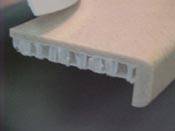 After the stone or solid surface veneers have been adhered to the CarbonCore cored panels, other treatments such as backsplashes and edges or cutouts for sinks and faucets may be performed. Industrial diamond cutters, saws, drills and hole saws used with lots of water seem to be the preferred method for cutting and shaping granite and marble. The thinner ¼” granite and marble would cut similar to porcelain or quarry tile, however most sources note it is best left to professionals. Cutting a hole for a sink costs approximately
After the stone or solid surface veneers have been adhered to the CarbonCore cored panels, other treatments such as backsplashes and edges or cutouts for sinks and faucets may be performed. Industrial diamond cutters, saws, drills and hole saws used with lots of water seem to be the preferred method for cutting and shaping granite and marble. The thinner ¼” granite and marble would cut similar to porcelain or quarry tile, however most sources note it is best left to professionals. Cutting a hole for a sink costs approximately
$200 and the appropriate bit about $150 never mind the router cost. If a $1500 countertop is cracked in the process, any small savings would pale in comparison.
Countertops with solid surface veneers should be easier to work with using normal routers and saws with carbide bits and blades.
Click on a picture to enlarge it.


